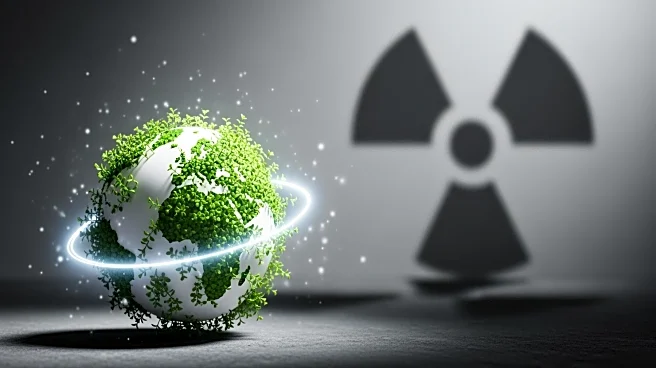What's Happening?
President Trump has announced the resumption of nuclear testing in the United States, citing the need to match other countries' testing programs. This decision has raised concerns among experts about the potential
environmental and health risks associated with nuclear testing. Historically, the U.S. conducted over 1,000 nuclear tests between 1945 and 1992, with a moratorium on such tests since then. The Environmental Protection Agency (EPA) warns that nuclear tests can release radioactive particles into the atmosphere, which can circulate globally for years. Experts are uncertain about the specific type of testing President Trump is referring to, with possibilities ranging from missile testing to explosive nuclear testing. The latter could have significant political and environmental consequences.
Why It's Important?
The resumption of nuclear testing by the U.S. could have far-reaching implications for global politics and environmental health. It may prompt other nuclear powers, such as Russia and China, to restart their own testing programs, potentially escalating nuclear tensions. Environmentally, nuclear tests can lead to radioactive contamination, affecting human health and ecosystems. The fallout from such tests can increase the risk of cancer and other illnesses due to radiation exposure. Communities affected by past nuclear tests are still dealing with the consequences, and new tests could exacerbate these issues. The decision also poses ethical questions about the responsibility of nuclear powers to prevent environmental harm.
What's Next?
The specifics of the testing program remain unclear, and it is uncertain whether the tests will be atmospheric, underground, or another form. The international community, including the United Nations, may respond with diplomatic pressure or sanctions to discourage the resumption of nuclear testing. Domestically, there may be legal and political challenges to the decision, as well as public protests from environmental and health advocacy groups. The U.S. government will need to address the potential health and environmental impacts, as well as the geopolitical ramifications of this decision.
Beyond the Headlines
The decision to resume nuclear testing could lead to a reevaluation of international nuclear treaties and agreements. It may also influence public opinion on nuclear policy and environmental protection. The ethical implications of exposing populations to potential radiation risks could become a significant point of debate. Additionally, the move could impact U.S. relations with allies and adversaries, as nuclear testing is a sensitive issue in global diplomacy.











